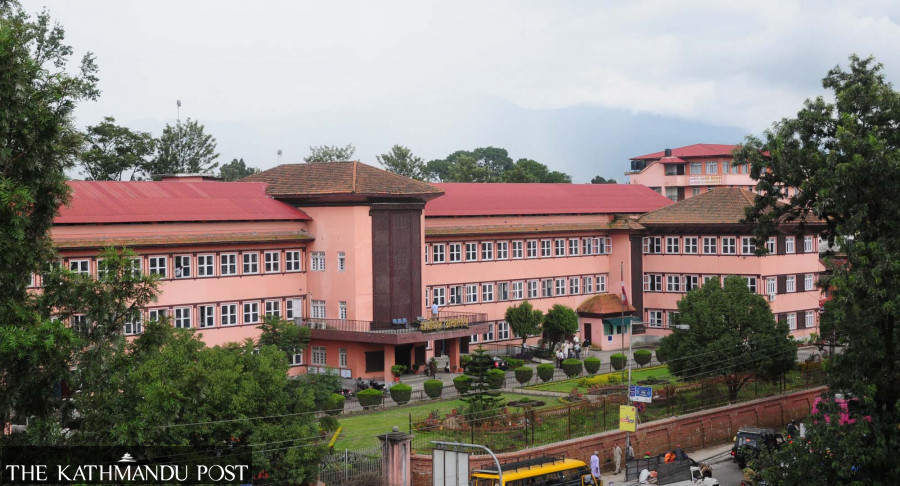National
Defendants’ lawyers argue President can use discretion while appointing prime minister
If Article 76 (5) meant there’d be no party intervention, it would have been mentioned in the constitution, advocate Panta says.
Binod Ghimire
As the hearing on the writ petitions against the dissolution of the House of Representatives inches towards conclusion, the lawyers of the defendants have argued that the President can exercise her discretion while appointing a prime minister.
Defending the move of President Bidya Devi Bhandari to reject the prime ministerial bids of both KP Sharma Oli and Sher Bahadur Deuba, the lawyers argued that Article 76 (5) of the constitution gives the President discretionary power.
“The President has the authority to use her conscience while appointing a prime minister,” said senior advocate Sushil Panta. “That is not even the subject of judicial review.”
Eight lawyers including deputy attorney generals and private lawyers presented their arguments on Wednesday.
President Bhandari on May 21 rejected the prime ministerial bid of Nepali Congress President Deuba, who had presented the signatures of 149 lawmakers of five various parties represented in the dissolved House of Representatives. Prime Minister KP Sharma Oli, meanwhile, had presented the decisions of the CPN-UML and the Janata Samajbadi Party seeking his reappointment to the post. Unlike Deuba, Oli had not presented the signatures of lawmakers.
The lawyers of the defendants argue that bids for prime minister must be credible and indisputable. Senior advocate Surendra Bhandari said both the bids were not credible so the President preferred not to appoint any of the candidates.
“One candidate applied for the post claiming the support of 153 lawmakers while the other submitted his bid with support of 149 lawmakers. The President used her conscience and avoided taking any decision that would have suggested mala fide intentions.”
He argued that as both the bids were disputable, the President’s decision to appoint either of the two as prime minister would have caused controversy.
But experts on constitutional affairs say if the President can use her conscience, she should have used it on other occasions also.
“You cannot argue that the President used her conscience only when it favours you,” advocate Mohan Lal Acharya, who specialises on constitutional law, told the Post. “Why didn’t she use her discretion and seek the opinion of experts or the Supreme Court before dissolving the House of Representatives.”
He said there is precedence of the head of the state (then King Birendra Shah) consulting the Supreme Court when the prime minister recommended a dissolution of the lower house.
When prime minister Surya Bahadur Thapa recommended dissolving the House of Representatives in 1998, King Birendra had refused to do so after consulting the Supreme Court. But, on every occasion Bhandari has swiftly endorsed the recommendations from the Oli government.
Her aides have been arguing that as a ceremonial head she cannot make decisions beyond the recommendations of the government.
Advocate Om Prakash Aryal, who also specialises on constitutional law, however, said it was the President's obligation to form a government as per Article 76 (5).
“If you argue that the President can use her conscience, you must accept that her decisions are subject to judicial review,” he told the Post. “You cannot argue that the President has inherent authority but her actions don’t come under the purview of judicial review.”
The lawyers of the defendants including Panta had argued that the Supreme Court cannot look into the President’s decision.
Putting his argument, Deputy Attorney General Gopal Prasad Rijal argued that there is no option with the court but to approve the President’s decision to reject Deuba’s bid for prime minister.
“The President has every authority to check the authenticity of the bids for prime minister,” said Rijal. “She rightly used her conscience and refrained from appointing either of the candidates with dubious claims.”
Countering the arguments by the lawyers of the plaintiffs, the defendants’ lawyers argued that the governance system in Nepal doesn’t accept a party-less system, hence Article 75 (6) very much requires the decision of the party.
Those advocating for the plaintiffs had argued that Article 76 (5) gives the individual lawmakers the right to make their decisions without intervention from their respective parties.
They said Oli presented the support of 153 lawmakers under the system where political parties prevail but Article 76 (5) allows individual lawmakers to make their choice.
They had claimed that the new provision was incorporated in the Constitution of Nepal to allow individual lawmakers to make the efforts to form a government so that the House doesn’t face an untimely dissolution.
Deuba had presented the signatures of 149 lawmakers from Nepali Congress, CPN (Maoist Centre), the Madhav Nepal faction of CPN-UML, the Upendra Yadav faction of Janata Samajbadi Party and Rashtriya Janamorcha on May 21 to claim the prime ministerial position as per Article 76 (5).
“If Article 76 (5) meant there would be no party intervention, it would have been mentioned in the constitution,” argued Panta, the senior advocate. “How can you presume things that are not written in the constitution?”




 9.51°C Kathmandu
9.51°C Kathmandu














